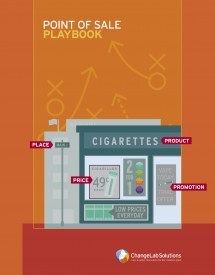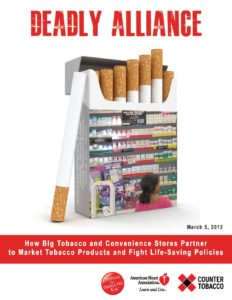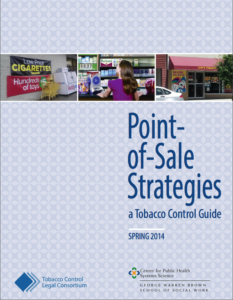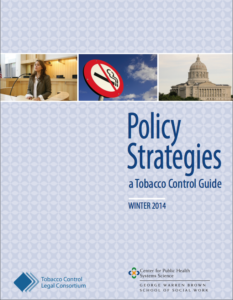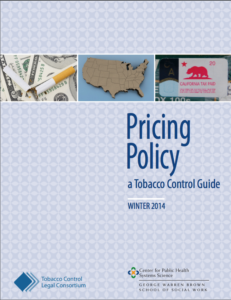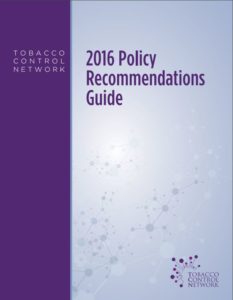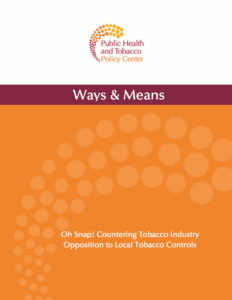Policy Solutions
Why policy is important
- Policy, systems, and environment change are tools to change the places where people live and make the healthy choice the easy choice.
- Policy change has historically played a major role in the success of tobacco control programs. Smoke-free air and tax policies have had great success in reducing tobacco use and exposure to secondhand smoke. The smoking rate among adults declined from 42% in 1965 to 14% in 2017. However, over 34 million Americans still smoke, and point of sale (POS) policy is the next frontier in reducing tobacco use even further.
- Policies can change the way commercial tobacco is promoted, sold, and used by transforming knowledge, attitudes, and practices of tobacco users and nonusers —changing what is happening at the store changes these norms too. Learn more about why retail tobacco control is important.
- Health Equity: Policies have the potential to help reduce disparities in commercial tobacco use and tobacco-related health disparities.
-
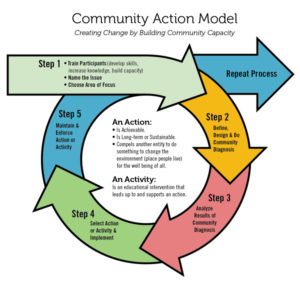
San Francisco’s Community Action Model Policy change is a process of identifying the problems, engaging the community and stakeholders, collecting data, devising solutions, implementing, and evaluating impact. For more information, review the following resources:
- Tools from the Center for Tobacco Policy & Organizing
- San Francisco Tobacco Free’s Community Action Model
- Policy Adoption and Implementation Model in “A Framework for Mobilizing Communities to Advance Local Tobacco Control Policy: The Los Angeles County Experience”
- Public Health Law Center’s Framework for Analyzing Tobacco Policy Interventions
Why these policies?
CounterTobacco.org’s policy solutions provide recommendations to help tobacco control advocates build support for and enact policies to counteract the sale and marketing of commercial tobacco products in the retail environment.
Selected based on research evidence, best practices in the field—research, legal practice collaboration, expert consensus, theories of human behavior, and evidence from the field (natural experiments);[1] this set of policy solutions present a menu of evidence-based, flexible strategies to help local, state, and federal practitioner select the best and most effective solutions to counter commercial tobacco sales and marketing in their communities. These pages contain the evidence, guidance, next steps, and resources to help practitioners develop and implement strong POS policies, as well as Stories from the Field to provide examples of successful policy implementation in communities across the United States.
The time is right. With the commercial tobacco control battle shifting to the “War in the Store,” many of the same best practices for community mobilization that have been effective in implementing other tobacco control policies can be used for POS strategies as well. The 2009 Family Smoking Prevention and Tobacco Control Act gave the United States Food and Drug Administration (FDA) the authority to regulate the manufacture, distribution, and marketing of tobacco products to protect public health. It also gave states and communities the ability to restrict the time, place, and manner of tobacco product promotions and advertisements.

It is important to consider POS work as one part of a broader tobacco control policy effort in your state or community. Strategic planning for a comprehensive retail tobacco control effort will help you determine which policies provide an appropriate approach for your community. Retail tobacco strategies are also key to the tobacco control “endgame” and can serves as a “booster” to the core strategies in the Tobacco Control Vaccine.[1] Learn more in our podcast episode on the Tobacco Control Vaccine Booster.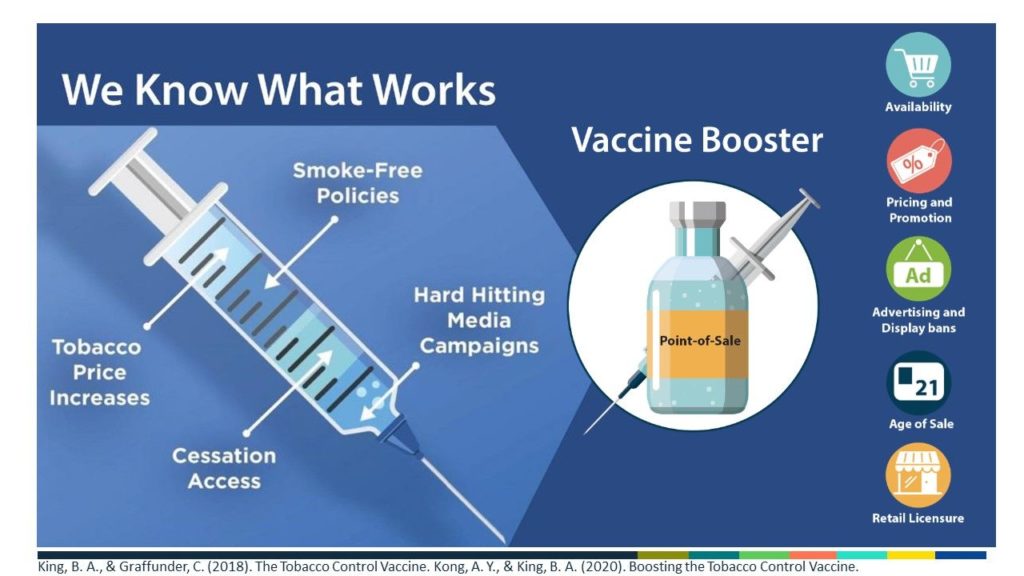
The information on these pages is no substitute for actual legal advice. As the tobacco industry has a long history of engaging in legal battles over policies that restrict tobacco sales and advertising, consult with legal centers from such as the Public Health Law Center, ChangeLab Solutions, the Public Health and Tobacco Policy Center on proposed policy language.
Where to start
Which evidence-bases strategy should your community pursue and when? There’s no ‘right’ answer for every community. When crafting a point-of-sale strategy, consider:
- Epidemiological and surveillance data
- Macro retail environment data
- Micro retail environment data
- Current policy context
- Local legal feasibility of policy options
- Potential for public health impact
- Political will
Learn more about each of these “data springs,” sources for each type of data, and how they can inform policy change. For help with the examining the macro and/or micro retail environment in your community or state or developing a point-of-sale tobacco control strategy contact our team at Counter Tools.
Point of Sale Policy Resources:
ChangeLab Solution’s Point of Sale Playbook provides an overview of POS policy options and learn about the foundational steps for creating a regulatory framework to support POS work.
The Deadly Alliance: How Big Tobacco and Convenience Stores Partner to Market Tobacco Products and Fight Life-Saving Policies provides more background on the importance of focusing on the retail environment
The Point-of-Sale Strategies from the Center for Public Health Systems Science at Washington University in St. Louis provides guidance on emerging strategies to limit the sale, display, and advertising of tobacco products in the retail environment
The Policy Strategies guide from the Center for Public Health Systems Science at Washington University in St. Louis provides guidance on how to work with the media, coalitions, decision makers, business owners, and communities to pass tobacco control policies including increasing the cost of and restricting access to tobacco products
The Pricing Policy guide from the Center for Public Health Systems Science at Washington University in St. Louis provides focuses on how to implement policies that effectively raise the cost of tobacco products
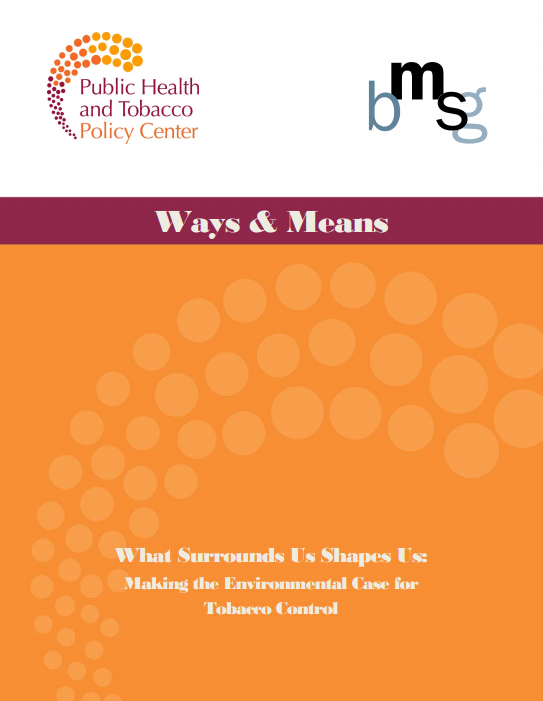
For strategies and information on framing: Berkeley Media Studies Group’s What surrounds us shapes us: Making the environmental case for tobacco control

California Department of Public Health’s Tobacco in the Retail Environment Fact Sheet, an overview of policy options
The Tobacco Control Network’s 2016 Policy Recommendations include, but are not limited to, point of sale policies. The recommendations declare a vision and direction for those policy and system changes which the Tobacco Control Network membership believe are most important to reducing and eliminating the health issues caused by tobacco use and secondhand smoke exposure.
The Public Health and Tobacco Policy Center’s “Oh Snap! Countering Tobacco Industry Opposition to Local Tobacco Controls” provides practitioners and public health advocates with information and evidence to refute arguments from industry opposition to common-sense tobacco controls at the local level.
Preemption
Be aware of preemption, which means that the laws at a higher level of government take precedence over the laws at a lower level of government. Learn more about options for POS activities in states and localities that are preempted.

